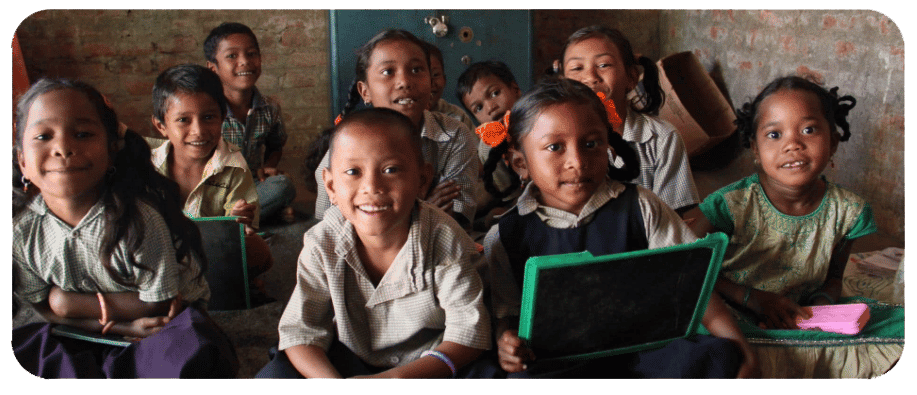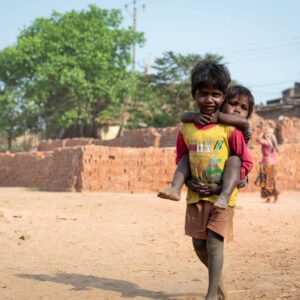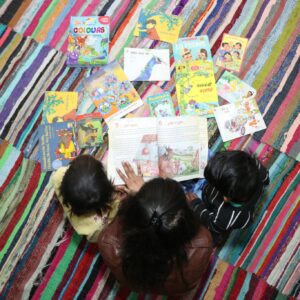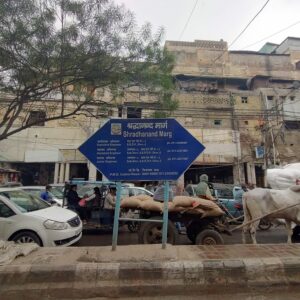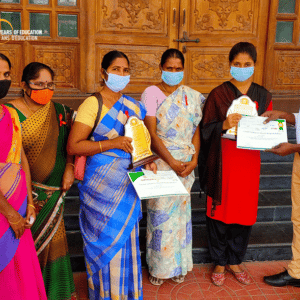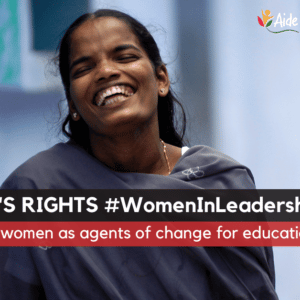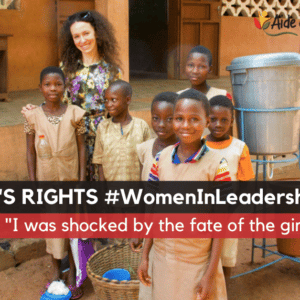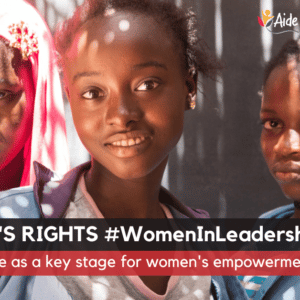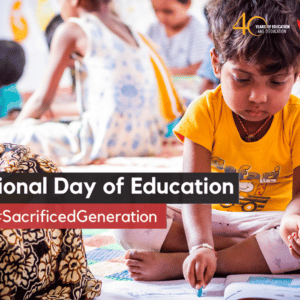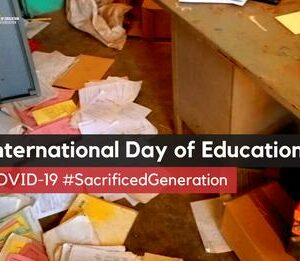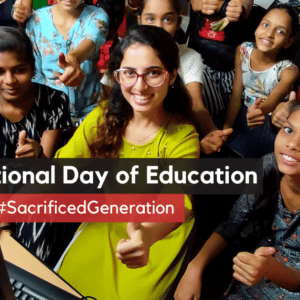As the issue of women’s rights appears to be receiving more media attention – hot on the foot of current trends such as #womensupportingwomen and #challengeaccepted – what constitutes women’s empowerment remains contested. For international nonprofit Aide et Action, empowerment is synonymous with the development of autonomy over one’s own future, made possible through education.
For some, participating in Instagram’s latest trend of sharing black and white photos of oneself and nominating others to do the same is a demonstration of solidarity and a call to promote women’s empowerment. Others claim this act of photo sharing falls short of anything near advocacy and critique it as an excuse to post a selfie for a vague cause.
At the time of writing, this viral trend has seen over 8 million people share the hashtag #womensupportingwomen. Regardless of the contentions, one thing is clear, women’s empowerment is a term that is garnering more and more attention and is an issue that international nongovernmental organisation (NGO) Aide et Action is also shining a light on through their new campaign Education Empowers.
A starting point
For NGOs like Aide et Action, empowerment is synonymous with the development of autonomy over one’s own future. Committed to increasing access to education for some of the world’s most vulnerable and marginalised populations, in particular girls and women, the organisation contends that education offers the chance to build a more equal, just and sustainable future.

In Burkina Faso, women are gaining greater autonomy and economic empowerment through Aide et Action’s projects supporting adult literacy and vocational training. Photo: Isabelle Merny, 2017.
Speaking at the launch of Aide et Action’s new campaign, Vanessa Perette, International Director of Fundraising, put an emphasis on the importance of education to deconstruct harmful stereotypes. “The struggle of gender inequalities begin at the very doorstep of school and education. The deconstruction of the mental and social representations built around women cannot be done without the participation of everyone: men, women, children, teachers, local and global leaders, communities, government and more” said Perette.
While women supporting women may be a good conversation starter, to achieve a more equal future, women’s empowerment must be a vision shared by all. Often the future is already scripted and not in the hands of the marginalised individual but in the hands of the larger powers at play – community leaders, local authorities, policymakers, parents, teachers, governments, institutions, business owners and more.
Exclusion in education
In 2019, UNESCO reported that twice as many girls as boys were expected to never start school leading to 16 million girls aged 6-11 years old missing out on a primary school education, compared to around 8 million boys.
Globally, 620 million children around the world do not have access to a single-sex toilet in school, which further prevents girls and female teachers from going to school safely. According to recent findings from WaterAid, this lack of sanitation leads to a third of the girls in South Asia missing school between one to three days a month during their period.

In Laos, female ethnic minority youth learn business skills in an entrepreneurship camp supported by Aide et Action. Photo: Supplied by Aide et Action Laos, 2019.
When a girl is denied the chance to go to school, the consequences can be devastating. Women alone represent 63% of the world’s 750 million illiterate adults. Speaking on the issue of education and women’s empowerment, film director Anastasia Mikova, describes inequitable access to education as an issue that we must address urgently.
In Woman, a film Mikova co-directed with Yann Arthus-Bertrand, the pair give a voice to 2,000 women across 50 different countries, offering an intimate portrait of women’s experiences around the globe. Mikova’s take-away from the project is that women who miss out on education are much more likely to face forced marriages and intra-marital violence.
Each year, 15 million underage girls are married, often leading them to miss out on school. Over 700 million women today were married before they turned 18 – that’s almost 10% of the world’s population. Each year around the world, approximately 16 million girls aged 15-19 and 2 million girls under 15 give birth to a child. 18 countries have no laws, policies or strategies to protect the rights of young girls to return to school after pregnancy.
A global effort
Across the globe, Aide et Action is working to reduce the barriers that women face in accessing education.

In India, Aide et Action’s Enlight project is increasing access to education for primary school age children across ten cities. Photo: Sandrine Assouline, 2018.
In India, where being born female too often means a girl will be deprived of education, Aide et Action has been implementing a project titled Enlight for the past five years which supports marginalised young girls of primary school age across ten cities to access education. “When we started our project, we first had to convince communities of the need to send their daughters to school. Meetings were organised once or twice a month to discuss this with families and in particular with mothers,” remarks Albert Bosgo, Head of the Enlight Project in Chennai, India. Today, Bosgo is pleased to see a big shift in the communities’ attitudes to education, where both adults and children alike are now convinced that education is the only way to break the cycle of poverty many have been trapped in.
In Burkina Faso, West Africa – where illiteracy and a lack of access to loans and land for women stand as obstacles to equality – the organisation’s Learning for Change (Apprendre Pour Changer: APC) project is enabling Burkinabe women to gain financial independence through literacy courses, vocational training, and financial support.
In Southeast Asia, gender disparities are found in upper-secondary education where in Laos for example, attendance rates for girls fall below 50%. Such disparity is directly linked to the entrenched norms that support the expected roles of each gender whereby unpaid domestic and care-work is given to women, and economically productive work is given to men. In 2019, Aide et Action launched a Leadership and Entrepreneurship Camp for Young Women in Lao PDR, supported by the British Embassy Programme Fund.
The camp was designed to be an empowering opportunity for rural ethnic women and girls aged 14 to 22 years old to gain skills and experience not found in a typical classroom. The objective was to equip the girls not only with business acumen and skills they desired but also with the courage and confidence to speak their minds and take on leadership roles in their communities.
In rural Cambodia, many girls may face pressure to quit school early to marry and start families or to help their families with farming or domestic work. Preschool teacher Suan Sokhom dropped out of school at Grade 10 to get married. Without a complete education, she never imagined she’d have the opportunity to become a preschool teacher but, against the odds, she joined one of Aide et Action’s projects and over the course of eight years has trained in early education and become a leader in her community, committed to providing quality early childhood care and education to marginalised children in her village. “I’m not the same person I was before the project – I’ve gained confidence and I’ve become a respected and valued member of my community” Sokhom explained.
“Our experience is showing that young women, especially rural women from poor backgrounds, move on to become leaders for their community” said Dr. Rukmini Rao. Psychologist, activist and Indian magazine The Week’s “woman of the year” in 2014, Dr. Rukmini Rao has been a member of Aide et Action’s Board of Directors since 2011. Speaking about the organisation’s Education Empowers campaign, she attests that if girls have access to education, they then have the opportunity to become changemakers.
In Mondulkiri province, Cambodia, Aide et Action has supplied ethnic minority children with radios so they can tune into educational broadcasts in their language. During nationwide school closures, in repsonse to Covid-19, radio is their only means to access an education. Photo: Christine Redmond, Aide et Action Southeast Asia, June 2020.

In Mondulkiri province, Cambodia, Aide et Action has supplied ethnic minority children with radios so they can tune into educational broadcasts in their language. During nationwide school closures, in repsonse to Covid-19, radio is their only means to access an education. Photo: Christine Redmond, Aide et Action Southeast Asia, June 2020.
Stepping forward in solidarity
Charles-Emmanuel Ballanger, International Director of Aide et Action, contends that speaking out for girls’ education and women’s literacy is essential, but it is not enough. “Currently, girls’ education remains hampered by many factors: poverty, discrimination, early marriage and pregnancies, unsafe environments and more … we must take urgent action” he said.
According to the World Economic Forum, at the current rate (before the outbreak of Covid-19 which may set things back even further), it will take 108 years to close the inequalities between women and men and 202 years to reach parity in the world of work. While Instagram trends such as #womensupportingwomen may initiate dialogues on important issues, there is much more work to be done to increase women’s participation in society and according to organisations like Aide et Action, this challenge begins with education.
Learn more about Aide et Action’s Education Empowers campaign: https://education.aide-et-action.org/en/empowers


